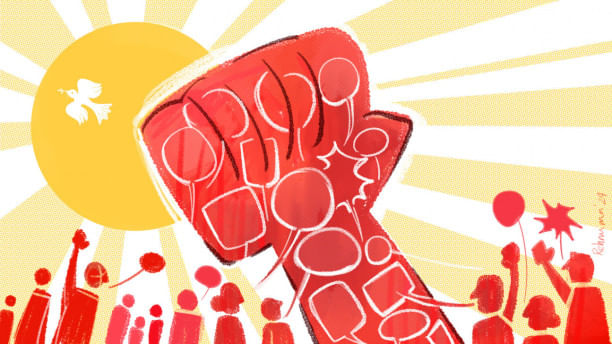Why Bangladesh needs deliberative democracy now

The July Revolution of 2024 has irrevocably altered the political trajectory of Bangladesh. The ouster of Sheikh Hasina, after years of political dominance, symbolises the aspiration of the masses. The uprising was not merely a rejection of the old political system but a call for a new era of governance rooted in accountability, inclusion, and deliberation. The formation of an interim government represents the culmination of years of frustration with authoritarianism, systemic corruption, and institutional decay. Bangladesh now faces a critical question: how can it institutionalise its people's aspirations into a sustainable governance framework? The answer lies in adopting deliberative democracy.
Unlike traditional democratic models, which often prioritise majority rule over consensus, deliberative democracy emphasises dialogue, inclusivity, and reasoned and active citizen participation in decision-making. At its core, deliberative democracy is about fostering trust in institutions. For Bangladesh, where mistrust of political elites in the existing system runs deep, this model could serve as an antidote to decades of disillusionment. Through forums, assemblies (citizen committees), and referendums, deliberative democracy, in contrast to conventional democracy (electoral democracy), actively includes people in the decision-making process. By ensuring that policies represent the will of the people, this strategy can aid in bridging the divide between the governed and the government.
For example, citizens' assemblies—randomly selected representative groups tasked with deliberating on specific policy issues—could be introduced to complement parliamentary decision-making. These assemblies have been successfully implemented in countries like Ireland and Canada. In Canada, they were used in British Columbia and Ontario to deliberate on electoral reform, showcasing their capacity to engage citizens in complex and technical policy discussions.
In Bangladesh, citizen assemblies could address pressing issues like electoral reform, education policy, climate adaptation, and health—areas where public input is crucial. The concept isn't entirely alien to our context. Local governance structures like ward meetings and open budget meetings reflect similar principles of citizen engagement.
However, these systems often fall short of their potential. The entrenched client-patron relationship and citizens' fear of raising their voices have hindered their effectiveness. For example, although the concept of participatory budgeting is present at the local government's union parishad level through open budget meetings, in practice, these communities rarely can decide on issues related to public fund allocation. A low quality of citizenship, marked by limited political awareness and civic courage, undermines these participatory mechanisms. As a result, ward meetings and similar forums are often reduced to tokenistic exercises rather than genuine platforms for deliberation.
The implementation of deliberative democracy would not only empower citizens but also ensure that resources are used efficiently and equitably. Moreover, deliberative processes can serve as a check on executive overreach by mandating public consultations and expert panels for major policy decisions. As a result, the government would be compelled to justify its actions based on evidence and public consensus rather than partisan interests.
While the theoretical benefits of deliberative democracy are compelling, its implementation will need to consider the existing power imbalances and social norms that stifle meaningful participation. Without a parallel effort to cultivate an empowered and informed citizenry, even the most well-designed participatory frameworks risk becoming symbolic gestures rather than instruments of real change.
Bangladesh requires extensive constitutional revisions to transition to a deliberative democracy. The current constitution, shaped by years of dictatorial changes, cannot support a genuinely deliberative democratic framework. Besides, the political culture of patronage and partisanship poses significant barriers to implementing deliberative democracy. Additionally, the lack of institutional capacity and resources hinders participatory initiatives.
The interim government can prioritise capacity-building, both within state institutions and civil society, to ensure that deliberative processes are effective and sustainable. Bangladeshi civil society has been at the forefront of the July uprising and can continue to play a pivotal role in the transition to deliberative democracy. By partnering with the government, academia, and international donors, they can help create the institutional architecture necessary for deliberative democracy to thrive.
Moreover, the media can act as a watchdog and facilitator of public discourse. By providing a platform for diverse perspectives and holding decision-makers accountable, the media can ensure that deliberative processes remain transparent and inclusive. In addition, public awareness campaigns are crucial to educate citizens about their rights and responsibilities in a deliberative democracy.
As the nation grapples with pressing challenges such as climate change, economic inequality, and youth unemployment, the need for effective and equitable governance has never been greater. Deliberative democracy, with its promise of collective problem-solving and trust-building, is the key to unlocking the country's full potential. Failure to do so would not only betray the aspirations of the July uprising but also risk the nation back into the cycle of authoritarianism and unrest.
Aishwarya Sanjukta Roy Proma is research associate at the BRAC Institute of Governance and Development at BRAC University. She can be reached at aishwarya.roy@bracu.ac.bd.
Views expressed in this article are the author's own.
Follow The Daily Star Opinion on Facebook for the latest opinions, commentaries, and analyses by experts and professionals. To contribute your article or letter to The Daily Star Opinion, see our guidelines for submission.




 For all latest news, follow The Daily Star's Google News channel.
For all latest news, follow The Daily Star's Google News channel.
Comments